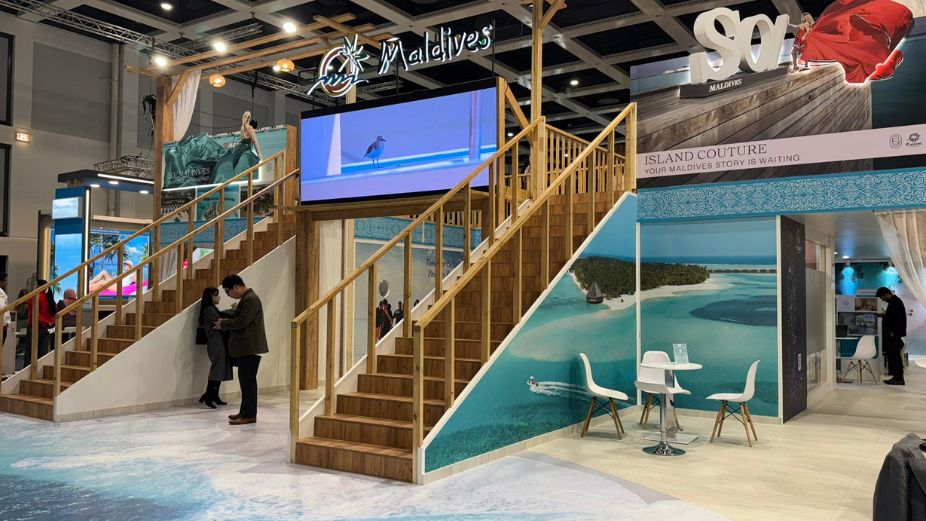
The Maldives’ showcase at ITB Berlin 2025 has stirred unease within the tourism industry, with stakeholders voicing growing concerns over the event’s diminishing returns and the strategic direction of the Maldives Marketing and Public Relations Corporation (MMPRC). As the nation strives to maintain its reputation as a world-class luxury destination, the effectiveness of its participation in this prestigious travel trade fair is coming under intense scrutiny.
Mohamed Firaq, a prominent figure in the Maldivian tourism sector, recently shared his observations on social media. Reflecting on the Maldives’ presence at ITB 2025, he noted, “The true essence of the Maldives’ tourism industry seems to be missing at ITB. The authenticity, vibrancy, and strong presence that once defined us need to be restored.” His comments, accompanied by an image of the Maldives’ elaborate booth featuring a tropical-themed staircase and ocean-inspired decor, highlight both the ambition and the perceived shortfall of the current approach.
The fair, traditionally a cornerstone of global tourism marketing, is facing questions about its relevance in the digital age. Many within the industry argue that ITB Berlin has become a costly branding exercise with limited concrete benefits. The absence of a broader spectrum of Maldivian tourism businesses at the event further illustrates this sentiment, with smaller operators reportedly opting out due to the perceived lack of return on investment.
Suresh Dissanayake, another industry commentator, raised a pertinent question on X: “Maldives branded taxis in Germany with a high-rise local island building promoting budget travel. Is this the right way to brand a luxury destination in a key market like Germany?” His comments reflect a broader debate about whether the Maldives’ marketing efforts align with its luxury travel identity, especially in markets like Germany, where high-end tourism is a significant draw.
Criticism is also mounting over the MMPRC’s strategic marketing initiatives and what some describe as wasteful spending. With rising competition from other tropical destinations and shifting traveller preferences, there is a pressing need for the Maldives to rethink its international promotion strategy. Industry experts advocate for more cost-effective and inclusive approaches that deliver genuine benefits to all stakeholders, rather than relying heavily on large-scale events like ITB Berlin.
The current model, they argue, fails to engage the full diversity of the Maldivian tourism ecosystem, leaving smaller businesses and local communities sidelined. This exclusion could undermine the authenticity and vibrancy that Firaq and others believe are essential to the Maldives’ brand.
As the Maldives navigates an increasingly competitive global market, the future of its destination marketing hangs in the balance. The industry is calling for a shift towards greater accountability and strategic focus, ensuring that promotional efforts reflect the nation’s unique selling points—luxury, exclusivity, and natural beauty—while maximising value for all involved.








